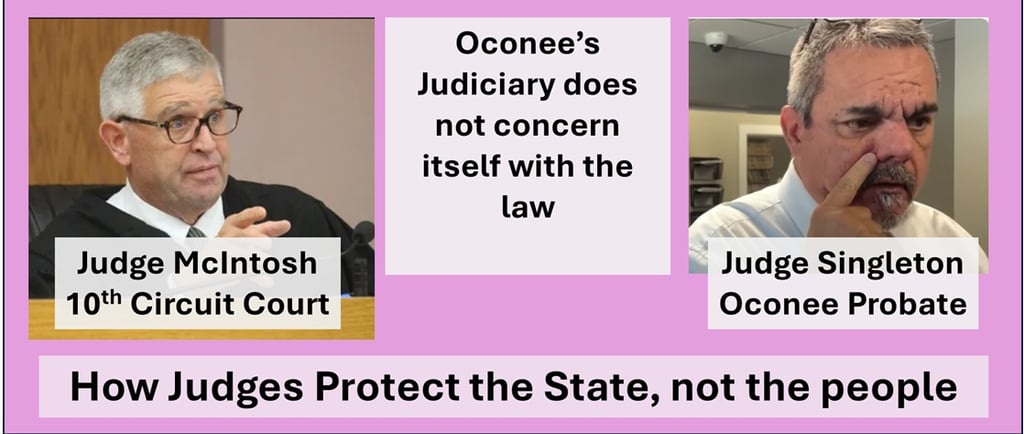Oconee Judge McIntosh Retaliates by Weaponizing Contempt
Expose of Judge Lawton McIntosh’s abuse of power in Oconee County, weaponizing contempt to silence criticism and protect corruption in South Carolina’s Tenth Circuit.


Could I really go to jail again, for the same thing? For criticizing a judge? Is this America?
On August 25, 2025, the South Carolina Court of Appeals dismissed my appeal of a contempt finding by Circuit Judge Lawton McIntosh, calling it “interlocutory” because sentencing had not yet occurred. In plain terms, that ruling left me exposed — vulnerable to the unchecked power and corrupt practices of the Tenth Circuit, where judges have grown accustomed to operating without accountability.
That vulnerability traces back to September 16, 2024. On that day, I stood in the Tenth Judicial Circuit courtroom and watched something that should chill anyone who still believes in the rule of law. Judge Lawton McIntosh, a circuit judge entrusted with the authority to uphold justice, discarded the law entirely in order to defend his pride. He declared me in contempt for publishing criticism of his conduct and the conduct of his allies, even though the gag order he was trying to enforce did not apply to the article in question, and had already been appealed to the South Carolina Court of Appeals. That appeal triggered a stay — a legal pause that made the gag order unenforceable. McIntosh knew it. Everyone in the courtroom knew it. Yet he pressed ahead, turning contempt into a judicial weapon for vengeance.
A stay isn’t complicated. It is the court’s own pause button. Once appealed, the order cannot be enforced unless the higher court lifts the stay. That means jurisdiction — the legal authority to act — no longer belongs to McIntosh. It shifts to the Court of Appeals. On September 16, McIntosh had no authority to punish me for speech. But authority wasn’t his concern. His ego was. He wasn’t defending the law; he was defending himself, and he was willing to trample constitutional limits to do it, in the classic way Oconee County does.
The trigger was an article I published on September 8, 2024: “Oconee County Courts: A Deepening Crisis of Corruption and Judicial Misconduct.” In it, I described collusion between attorneys and judges, my own jailing without a case number or release papers, ex parte communications that funneled evidence directly into chambers, and an illegal subpoena. The article was sharp, but every word was rooted in facts and documents. It was protected speech based solely on the public record. The article could not be subject to any gag order because it was First Amendment–protected speech — even if the gag order had not been stayed. And that is precisely what McIntosh could not tolerate.
On September 12, 2024, he lashed out from the bench. There was no notice, no prosecutor, no defense. He declared me guilty in a courtroom monologue, threatened me with six months in jail per publication, and twisted contempt into a personal club. He blurred the line between civil and criminal, stripping away the protections of both, and made clear that in his court, due process is optional when his feelings are hurt.
The reason McIntosh feels bold enough to act this way is simple: in the Tenth Circuit, he can. This corner of South Carolina’s judiciary has long operated as a good ol’ boy outpost, where accountability is scarce, oversight is weak, and the judges know they can get away with ignoring the law to protect themselves and their friends. McIntosh has thrived in this culture for decades. He has learned that retaliation comes without consequence, that contempt can be stretched and distorted into whatever tool he needs it to be.
And now, with the Court of Appeals dismissing my September 16 appeal as “interlocutory” because he has not yet sentenced me, he sees an open lane to finish what he started. He has already weaponized contempt once against protected speech. Now, unless the appellate court intervenes, he has the green light to put me in a cell for daring to tell the truth.
This is not just about me. It is about whether the law in Oconee County is still law at all, or whether it has been reduced to a stage prop for a judge protecting a criminal enterprise that stretches from the bench to the sheriff’s office, local police, the solicitor’s office, and even the public defender system. McIntosh has shown in plain sight that he believes he stands above the rules. If he can jail a man for writing about corruption while a gag order is stayed, then we have crossed the line into something far darker: a judiciary that has become a weapon of the state, not a system to secure justice.
The question could not be clearer: does a judge’s personal grudge outweigh the Constitution in Oconee County? On September 16, 2024, Judge McIntosh acted as if it did. And unless the appellate courts are willing to prove otherwise, the message to the public is unmistakable — here, justice is whatever the judge decides it is, and criticism comes at the price of your liberty.
McIntosh is not a judge; he is a criminal in a robe. In America, judges are given what’s called “absolute immunity” — protection from lawsuits for their decisions — but only so long as they act within their jurisdiction. On September 16, 2024, when McIntosh declared me in contempt and then dangled sentencing over my head like an executioner’s axe, he was not exercising judicial authority. He was committing a crime under the color of law. He tried to silence me, not only from criticizing him, but from defending myself against his crooked ally, Probate Judge Danny Singleton. In that moment, McIntosh didn’t just disregard the Constitution — he treated it with open contempt, wiping himself with it before flushing it down the toilet. Is this really what the 10th circuit judiciary has become? Or was it always this way?
Let’s be clear: McIntosh had no jurisdiction when he made that contempt finding. The gag order he pretended to enforce was already under appeal and legally stayed. That meant it was unenforceable, and he had no power to act. Stripping away the courtroom jargon, this was not a judicial act protected by immunity. It was a criminal act — a willful abuse of authority meant to intimidate and retaliate.
I am not asking for special treatment. I am demanding the bare minimum. That a stay means stop. That jurisdiction means know your limits. That contempt is not a weapon of the state or a shield for fragile egos. That the First Amendment still means something. And that no citizen should be thrown in jail because a judge got angry about words — words taken from the public record and spoken in public. These are not radical demands. They are the foundation of what America claims to stand for.
If a judge’s vendetta is allowed to define justice in Oconee County, then justice doesn’t live here anymore. I do not believe this is what the people of Oconee County want — a rogue judiciary, emboldened to shield the wrongdoing of county authorities by weaponizing the courts, showing blatant disregard for the law and for the rights and well-being of the vulnerable, all at the behest of the power elites who control both the economy and the police.
I am grateful they mistook me for someone incapable of defending myself, because it gave me the opportunity to stand up for justice in Oconee County.
